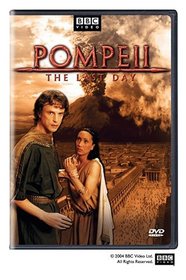| Actors: Jamel Aroui, Lotfi Dziri, Jeffrey Gibson, John Benjamin Hickey, Aykut Hilmi Directors: Peter Nicholson, Tilman Remme Creators: Ailsa Orr, Andrea Cornwell, Jonathan Stamp, Edward Canfor-Dumas, Georgann Kane, Steven Manuel Genres: Indie & Art House, Drama Sub-Genres: Indie & Art House, Drama Studio: BBC Warner Format: DVD - Color - Closed-captioned DVD Release Date: 02/01/2005 Original Release Date: 03/14/2004 Theatrical Release Date: 03/14/2004 Release Year: 2005 Run Time: 0hr 50min Screens: Color Number of Discs: 1 SwapaDVD Credits: 1 Total Copies: 0 Members Wishing: 0 MPAA Rating: NR (Not Rated) Languages: English See Also: |
Search - Pompeii - The Last Day/Colosseum - A Gladiator's Story on DVD
  | Pompeii - The Last Day/Colosseum - A Gladiator's Story Actors: Jamel Aroui, Lotfi Dziri, Jeffrey Gibson, John Benjamin Hickey, Aykut Hilmi Directors: Peter Nicholson, Tilman Remme Genres: Indie & Art House, Drama NR 2005 0hr 50min Studio: Warner Home Video Release Date: 05/24/2005 |
Larger Image |
Movie DetailsSimilar Movies
Similarly Requested DVDs
|
Member Movie ReviewsReviewed on 1/28/2014... This DVD was not what I was expecting however I really enjoyed it. It gave me a lot of facts as to how things really happened.
Movie ReviewsWhen combat was entertainment Alejandra Vernon | Long Beach, California | 03/27/2004 (5 out of 5 stars) "A realistic docu-drama, this is a telling of the building of Rome's Colosseum which started under the rule of Emperor Vespasian and was completed by his son and heir Titus in 80 AD. It also shows the training of the gladiators, many who were slaves, but a few who would trade their liberty for a period of time for money, and sometimes fame. The decadence and brutality of the Roman games, as well the brave and desperate men who were the entertainment, make for a riveting story; The central figure is a historical gladiator by the name of Verus, who was a slave working in a quarry when chosen for the arena. Robert Shannon is good in the part, exhibiting much physical prowess, grace and style. Filmed in Tunisia, it boasts the latest technological wizardry to duplicate the Colosseum and the audience, using matte paintings and crowd replication among other techniques. Produced and directed by Tilman Remme, the dialog is in Latin, and the narration by Liev Schreiber, whose modulated voice is always a pleasure to listen to. Having seen the empty shell of what is left of this extraordinary structure as it stands today, I found this recreation fascinating and informative, with enough drama and action to make it interesting for repeated viewings." EXCELLENT MOVIE/documentary E. Peplow | Park Ridge, Illinois | 02/06/2005 (5 out of 5 stars) "First of all, let me express my feelings on this movie-WOW! This DVD has a narrator that pops in and out leading the viewer through the lives of some of Pompeii's citizens. He then lets you basically enter into their lives and you somewhat feel that you are watching the "mountain" (they did not know it was a volcano in 79 AD) explode. I was really moved just seeing how people dealt with this disaster. The movie also shows the artifacts of today linking them with the characters in the story. They also show the casts of the people as they lived out their last minutes on Earth. Let me say that this is one of the best movies out there. You will not be disapointed. Even to the guys that like action flicks, I think you will like this one since it is a TRUE story. For the gals out there, you will also love it as I did since it is a dramatization of something TRUE. I usually don't buy just any movie, but I am definately glad that this is one I spent money on. ENJOY!" Excellent DVD combo... A. Verlay | Montréal, Canada | 02/19/2005 (4 out of 5 stars) "...but not the one shown on the Discovery Channel though.
All the reviews you are going to read below are excellent, this DVD is a very good combo (the gladiator documentary is also of very good quality) extras are numerous and interesting. HOWEVER the version played on TV was 1 hour 40 minutes long instead of the English version of 50 minutes we have on this DVD. The editing is different, the music is different, the narrator is different (american accent). There is a 50 minutes additional part with all the actual site of Pompeii and it's dangers to the new cities that were built since the eruption which is also very informative. Both versions, English and American are very good, I guess you just have to make your own opinion when you'll see a reprise of the show on TV (or you can still go on the discovery web site to find the American version DVD which does not include the Gladiator combo...) It's time Amazon.com start providing the DVDs from this source as well, because if you are interested in Documentaries you don't have access to all choices available just by visiting their website right now..." |















